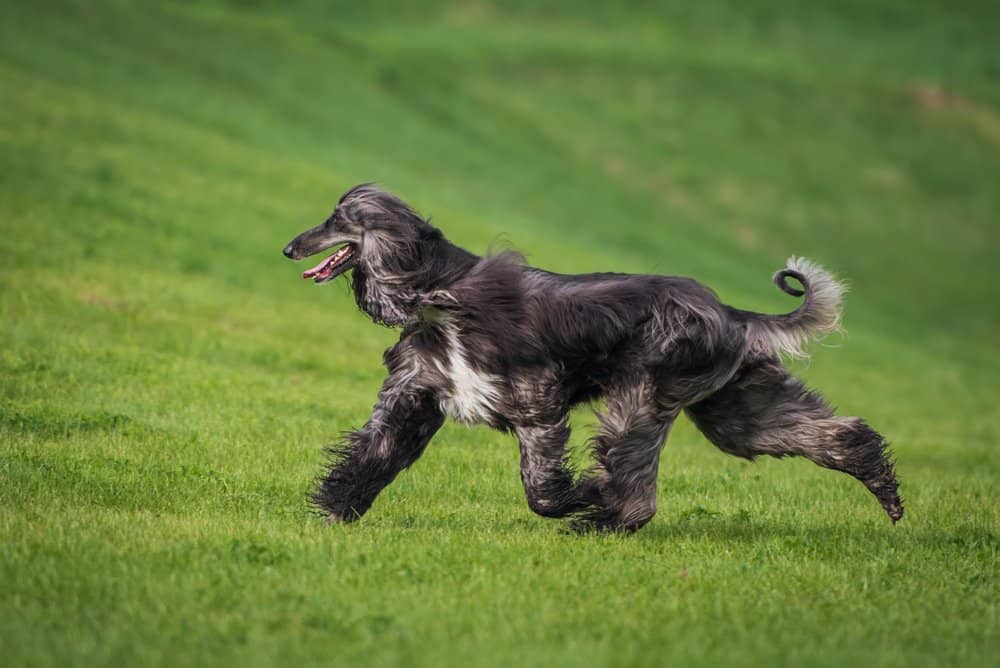When it comes to popular pups, there is one canine friend that has made quite a name for himself. His popularity is not due to his appearance or his skills, but rather the incredible way in which he entered this world. We are referring to a special dog named Snuppy. He is famous around the world for being the first ever dog clone.
Snuppy was the first of his species to be successfully cloned. But it took many years and attempts to make this happen. Let’s break down all the details of this scientific achievement!
What Does It Mean to Be Cloned?
What is a clone? Cloning involves creating a genetically identical specimen by using a single cell or organism. The clone is created asexually in a lab setting. It often involves placing the embryo in a surrogate for further development.
Meet Snuppy – The First Dog Clone

The first ever cloned dog was a beautiful Afghan Hound named Snuppy.
©Maria Ivanushkina/Shutterstock.com
Snuppy was a cloned Afghan hound that took the scientific world by storm. He was born to a surrogate on April 24, 2005, and he lived to be 10 years of age. Other species had been successfully cloned at this time, but Woo Suk Hwang wanted to create the first canine clone. Snuppy was named the “Most Amazing Invention” of the year in 2005. This was due to the impressive work by Woo Suk Hwang and his team at the Seoul National University.
How Was Snuppy Created?
The scientific process behind Snuppy’s creation was long and tedious. It became obvious that it was much harder to clone dogs than other animals. This is likely due to the fact that a dog’s eggs mature days after being released from the ovary, rather than before they are released like with many other species. The team had to wait three days after ovulation to collect the eggs from the donor female.
After removing the DNA from the eggs, they combined the altered eggs with skin cells from another dog. They collected these cells from the ears of an Afghan hound named Tai. Tai was the dog they were attempting to clone.
Once the eggs were fused with Tai’s DNA, they performed a chemical shock. This led the fused cells to begin the dividing process, and they soon divided to form an actual embryo. The embryo was then placed in a canine surrogate. Eventually, a special pup named Snuppy was born.
Was Snuppy Birthed Like a Normal Puppy?
Snuppy may not have been the result of nature mating, but he grew in a womb just like other puppies! Snuppy was actually one of two clones that were created by the implanted embryo. He developed alongside his clone sibling.
Because it was critical for the birthing process to go smoothly, the team performed a C-section on the surrogate mom. Two pups were born, but Snuppy’s sibling died within days from suspected pneumonia. Snuppy was the only surviving puppy of this cloning process.
Was Snuppy Healthy?
Snuppy’s sibling died soon after birth, but Snuppy went on to live a long and healthy life! Not only did he go on to live happily for 10 years, but he also fathered puppies of his own in 2008. Snuppy was a treasured university mascot for quite some time, and his cells paved the way for canine clone research to come.
Now That It’s Possible, Should You Clone Your Family Dog?

Cloning involves creating a genetically identical specimen by using a single cell or organism.
©CI Photos/Shutterstock.com
If you are lucky enough to have a beloved dog at your side, you can understand the desire to have them in your life forever. Now that you know it’s possible, you may be wondering if you should clone your dog. But this is still a controversial topic for a couple reasons.
The first reason is that the process can cost up to $50,000. You will also need to find a veterinarian that is willing to do the procedure and specialized enough to make it happen. Even if you meet these requirements, it is still not a guaranteed process. This means you could be out a ton of money and still walk away without a cloned pup.
The next reason that experts discourage pet owners from cloning is that you will never get the exact same dog you are hoping to clone. While it might be identical genetically, you can never replicate the personality. There are many factors that contribute to a dog’s unique behavior and personality, and this cannot be replicated in a lab. We know pet parents want their beloved dogs to live forever, but as of right now, it’s not likely to happen.
Final Thoughts
Snuppy’s legacy will live on in the science world forever! He may not be with us any longer, but his cells continue to pave the way for impressive research!
The photo featured at the top of this post is © iStock.com/lvaloueva
Ready to discover the top 10 cutest dog breeds in the entire world?
How about the fastest dogs, the largest dogs and those that are -- quite frankly -- just the kindest dogs on the planet? Each day, AZ Animals sends out lists just like this to our thousands of email subscribers. And the best part? It's FREE. Join today by entering your email below.
Thank you for reading! Have some feedback for us? Contact the AZ Animals editorial team.







